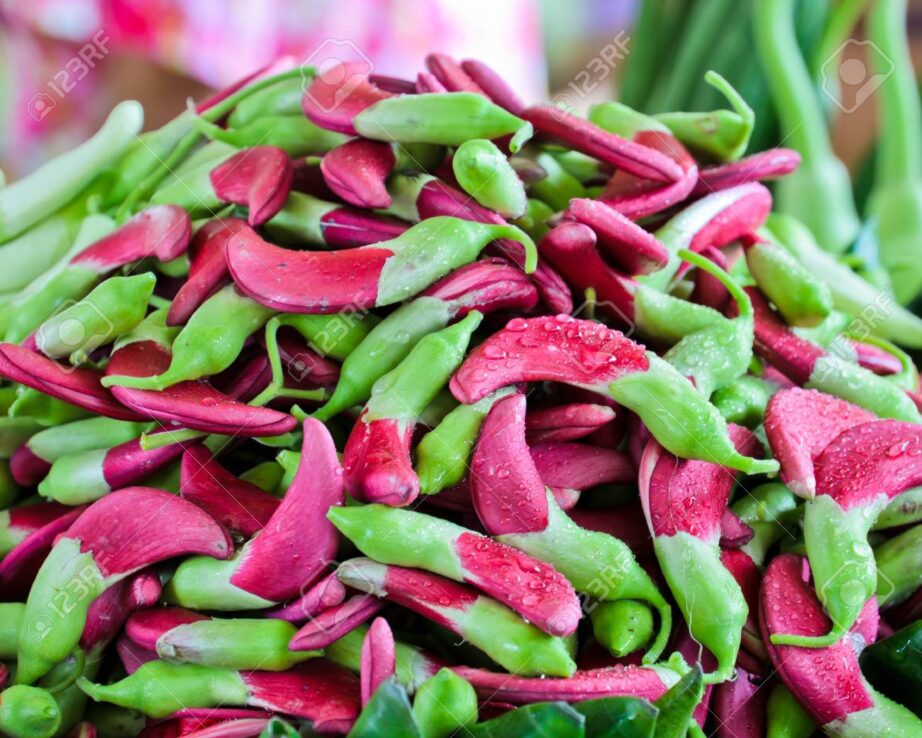
HUMMINGBIRD TREE SESBANIA GRANDIFLORA ASIAN VEGETABLE SEEDS PER 5 FOR SALE $4……ADD $4 PACK/POST TO THE ORDER. AUSTRALIA WIDE.

Sesbania grandiflora,commonly known as vegetable hummingbird, West Indian pea, agati, or katurai, is a small tree in the genus Sesbania in the legume family. It has edible flowers and leaves commonly eaten in the Southeast Asia and South Asia.
Description

It is a fast-growing tree. The leaves are regular and rounded and the flowers white, red or pink. The fruits look like flat, long, thin green beans. The tree thrives under full exposure to sunshine and is extremely frost sensitive.

It is a small soft wooded tree up to 3–8 m (10–26 ft) tall. Leaves are 15–30 cm (6–12 in) long, with leaflets in 10–20 pairs or more and an odd one. Flowers are oblong, 1.5–10 cm (1–4 in) long in lax, with two to four flower racemes. The calyx is campanulate and shallowly two-lipped. Pods are slender, falcate or straight, and 30–45 cm (12–18 in) long, with a thick suture and approximately 30 seeds 8 mm (0.3 in) in size.
Origin and distribution

It is native to Southeast Asia (Malaysia, Philippines, Brunei) to Northern Australia, and is cultivated in many parts of India and Sri Lanka. It has many traditional uses.[6] It grows where there is good soil and a hot, humid climate.
Medicinal uses

The leaf extract may inhibit the formation of advanced glycation end-products.The leaf extract contains linolenic acid and aspartic acid,which were found to be the major compounds responsible for the anti-glycation potential of the leaf extract.
Culinary uses

The flowers of S. grandiflora are eaten as a vegetable in South Asia and Southeast Asia, including Laos, Thailand, Java and Lombok in Indonesia, Vietnam, Maldives (locally known as Feeru Muran’ga, ފީރު މުރަނގަ), Sri Lanka, and the Ilocos Region of the Philippines.

In Khmer language, the flowers are called ផ្កាអង្គាដី (angkea dei) and young leaves and flowers are used in the cuisine both cooked in curries, such as Samlor mchou angkea dei and salad sauce bok amproek or toek kroeung.[citation needed]
In the Thai language, the flowers are called ดอกแค (dok khae) and are used in the cuisine both cooked in curries, such as kaeng som and kaeng khae,[10] and raw or blanched with nam phrik.[

The young pods are also eaten. In Sri Lanka, agati leaves, known as Katuru murunga in Sinhala language, are sometimes added to sudhu hodhi or white curry, a widely eaten, thin coconut gravy. In India, this plant is known as hadga (हादगा in Marathi), agati (Tamil), agastya (Kannada), అవిసె (Telugu), and both the leaves and the flowers have culinary uses. It is known as Bok phool (বকফুল) in West Bengal, India and Bangladesh, and is eaten after being fried with gram paste

| Sesbania flower, raw | |
| Nutritional value per 100 g (3.5 oz) | |
| Energy | 113 kJ (27 kcal) |
| Carbohydrates | 6.73 g |
| Fat | 0.04 g |
| Protein | 1.28 g |
| Vitamins | Quantity %DV† |
| Thiamine (B1) | 7% 0.083 mg |
| Riboflavin (B2) | 7% 0.081 mg |
| Niacin (B3) | 3% 0.43 mg |
| Folate (B9) | 26% 102 μg |
| Vitamin C | 88% 73 mg |
| Minerals | Quantity %DV† |
| Calcium | 2% 19 mg |
| Iron | 6% 0.84 mg |
| Magnesium | 3% 12 mg |
| Phosphorus | 4% 30 mg |
| Potassium | 4% 184 mg |

SESBANIA GRANDIFLORA PLANT SEEDS & PODS image www.sunblestproducts.com
Any questions or if buying, contact me HERE


